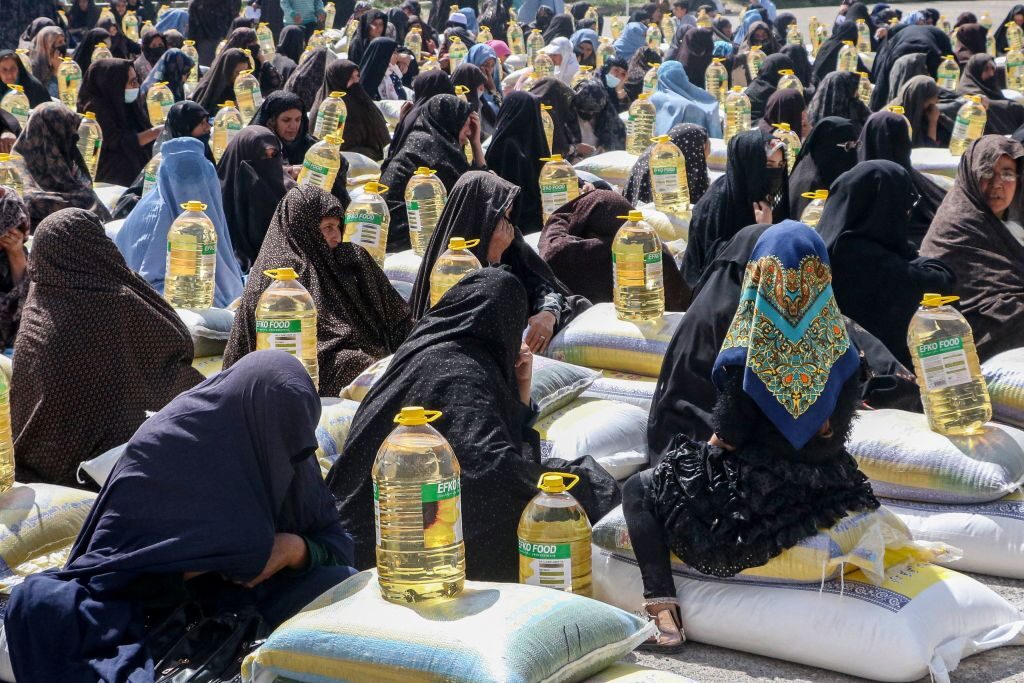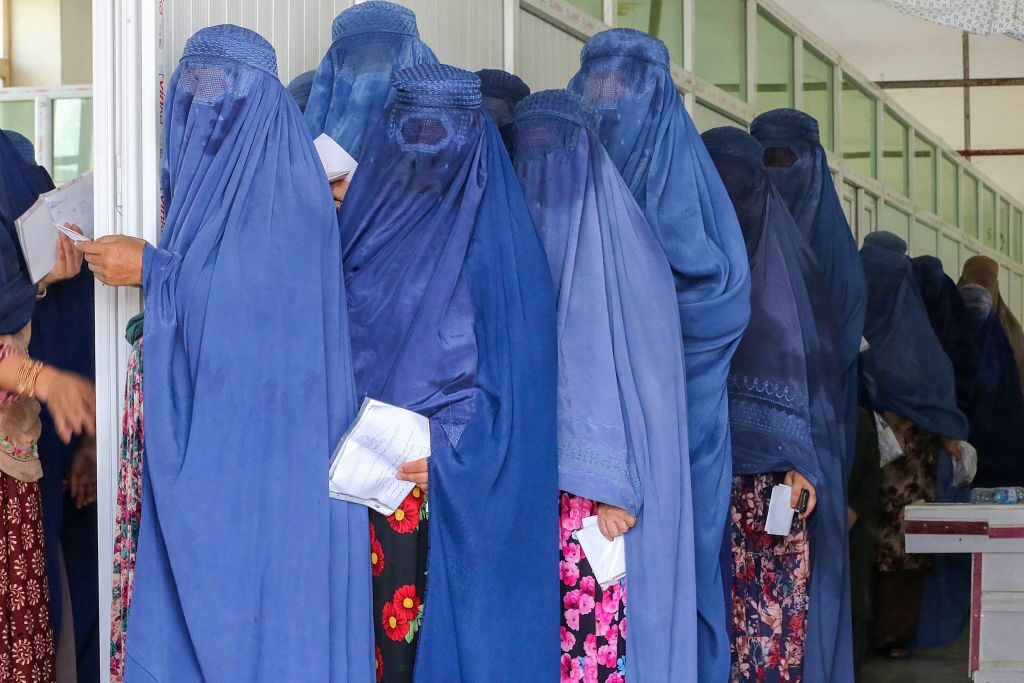The office of the Special Inspector General for Afghanistan Reconstruction (SIGAR), a federal watchdog agency, revealed in a report published Tuesday that America “remains the largest donor” to Afghanistan nearly two years after the Taliban’s conquest of the country – and the Taliban is taking credit for much of that aid.
SIGAR was established to monitor American taxpayer spending in Afghanistan during the 20-year war, which was supposed to end in May 2021 but continued into August of that year after leftist President Joe Biden chose to violate an agreement to leave the country made by predecessor Donald Trump. That decision prompted the Taliban, the jihadist terror organization that ruled the country prior to America’s 2001 invasion, to launch a national assault on the fragile U.S.-backed government. Then-President Ashraf Ghani responded to the attacks by fleeing the country and leaving it in Taliban hands. The Taliban have remained the uncontested authority in the country since August 15, 2021.
Despite extracting troops from the country following the Taliban’s victory in 2021, Biden has maintained America’s status as the “largest donor to the Afghan people, having appropriated more than $2.35 billion since the Taliban takeover in August 2021,” according to the SIGAR report, dated July 30 but published on Tuesday. The report covers the timeframe between April 1 and June 30 of this year.
“In addition to direct U.S. assistance to the people of Afghanistan, the United States is also the single largest donor to the United Nations’ humanitarian response in Afghanistan,” SIGAR observed. Among the United Nations programs heavily involved in Afghanistan are the Nobel-Peace-Prize-winning World Food Program (WFP) and the UN Office for the Coordination of Humanitarian Affairs (UN OCHA). SIGAR reported that America has donated more to the UN OCHA’s Humanitarian Response Plan for Afghanistan than any other country at $74.4 million; the program remains currently only about 14 percent funded.
FLASHBACK: President of Afghan Resistance Group Says America Sending $40 Million a Week “Empowering Taliban”
Tera Dahl
John Sopko, the Special Inspector in charge of SIGAR, wrote in the report that the Biden Administration’s prodigious donations to Afghanistan raise significant concerns because the Taliban has strongarmed humanitarian organizations on the ground into diverting emergency funds.
“[I]t is no longer a question of whether the Taliban are diverting assistance from our programs to help the Afghan people, but rather how much they are diverting,” Sopko wrote in the introductory letter to this quarter’s report. “[M]y staff and I find the degree of interference and the apparent inability of the UN to protect its programs deeply troubling.”
The United Nations, he continued, is in charge of “most current donor assistance” and has largely failed to prevent the Taliban from usurping control of the aid and using it in their propaganda to the Afghan people.
“While this research is ongoing, SIGAR has heard allegations from dozens of interviewees that diversion of aid and interference into aid delivery by such regimes is common,” the report observed, adding that “Taliban interference with NGO [non-governmental organization] work escalated, leading to a steady decline in humanitarian access in 2023.”

Afghan women wait to receive food aid distributed by a charity foundation during the Islamic holy fasting month of Ramadan in Herat on April 11, 2023. (MOHSEN KARIMI/AFP via Getty Images)
The report relied heavily on an investigation recently conducted by the United States Institute of Peace (USIP) that concluded that the Taliban largely held control of humanitarian aid in the country and diverted it as it wished.
“This quarter, an analysis prepared by the United States Institute of Peace (USIP) for USAID found that the Taliban are ‘pushing for ever-increasing degrees of credit and control over the delivery of aid,’” SIGAR reported.
The USIP report itself concluded that the United Nations was at the center of the most egregious abuses of aid.
“According to multiple UN officials across different agencies, the Taliban have effectively infiltrated and influenced most UN-managed assistance programming,” USIP concluded.
SIGAR asserted, citing the USIP report, “the Taliban are comfortable accepting foreign support insofar as they can closely monitor the organizations, including restricting and controlling them, and claim some credit for the provision of the benefits.”
The Taliban terrorist organization is strutting and bragging that the Biden administration has agreed to provide aid to Afghanistan. https://t.co/5X1hHMUPTY
— Breitbart News (@BreitbartNews) October 12, 2021
“The Taliban are attempting to control the narrative in Afghanistan by seeking to win credit for the aid delivered, possibly due to their understanding that the economy is ‘growing very slowly’ and ‘future revenue growth may be weak,’ limiting funds for Taliban-driven civil society spending. USIP describes the Taliban’s stance as one of ‘pragmatic opportunism,’ accepting NGOs that provide the most ‘perceived utility.’”
In the immediate aftermath of the Taliban’s conquest of Afghanistan in 2021, the United States, U.N., and international financial organizations such as the World Bank froze Afghan state assets and refused to recognize the Taliban as the legitimate government of the country.
No other nation on earth has formally recognized the Taliban – even allies such as China and Iran refer to the Taliban as an “interim” government – but the WFP moved rapidly to restore its operations in the country through the jihadist terror group. Top Taliban diplomat Suhail Shaheen announced before August 2021 was over that the head of the Taliban’s “political” office in Qatar received David Beasley, the head of the WFP, for discussions on how to restore aid.
Anonymous reports in American newspapers claimed the U.S. Treasury Department had given a “green light” before August was over to some humanitarian organizations to continue working on the ground in Afghanistan. The World Bank announced in March 2022 that it had approved the transfer of $1 billion in aid to “Afghanistan,” landing in the hands of the Taliban.

Afghan burqa-clad women wait in a queue to receive money as a humanitarian aid from the International Federation of Red Cross and Red Crescent Societies (IFRC), in Jalalabad on August 6, 2023. (SHAFIULLAH KAKAR/AFP via Getty Images)
Afghanistan’s population is one of the world’s most destitute. Estimates from this month suggest that as many as 30 million people are in “dire” need of food, medical, and other humanitarian aid in the country. The Taliban’s propaganda arms, most prominently the Bakhtar News Agency, leverage the crisis by flooding Afghans with reports of the Taliban’s alleged successes in distributing aid.
Bakhtar’s pages are full of articles with announcements from Da Afghanistan Bank, the nation’s central bank, and Taliban leaders of millions of dollars arriving in Kabul meant for humanitarian aid. Local Taliban officials host photo opportunities with impoverished civilians distributing basic items such as oil, flour, and legumes. The WFP features heavily in these reports; the United States is never mentioned as a pivotal donor.


